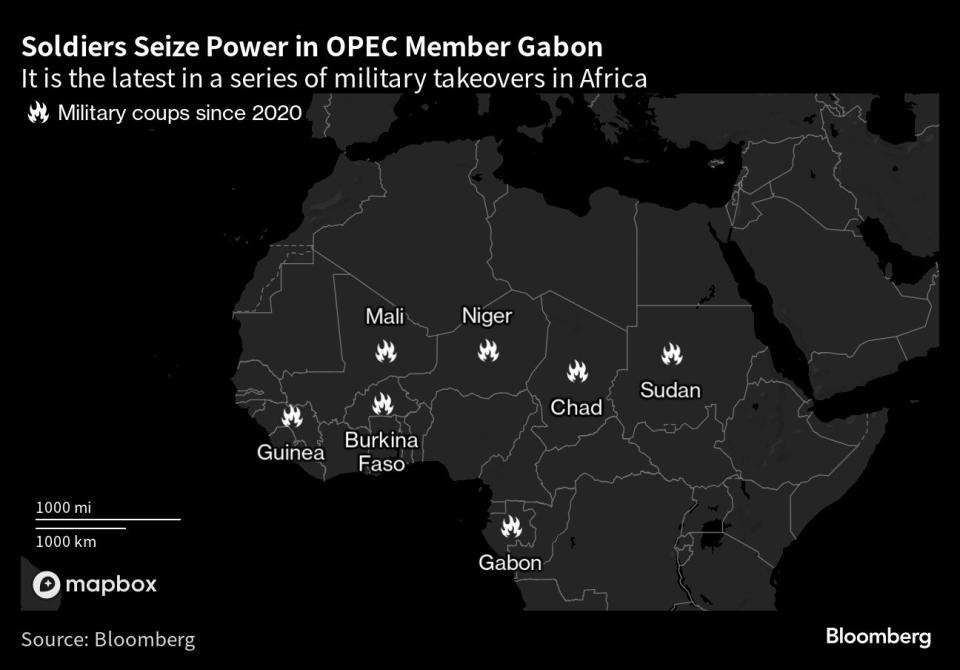Gabon Junta Appoints Army Officer as Transitional President
- Oops!Something went wrong.Please try again later.
(Bloomberg) -- Soldiers in Gabon appointed the head of the republican guard as the OPEC member state’s new leader, hours after placing President Ali Bongo under house arrest and annulling elections in which he secured a third term.
Most Read from Bloomberg
Europe's Biggest Oil Company Quietly Shelves a Radical Plan to Shrink Its Carbon Footprint
UBS Flags Cost Cuts After $29 Billion Credit Suisse Windfall
The putsch in the former French colony is the ninth in sub-Saharan Africa in the past three years, and follows a coup in Niger last month. The military takeover drew condemnation from the US, Nigeria, France and the African Union, as it sparked a slump in the nation’s dollar bonds and raised concerns of a spill over of the selloff to other African countries with high political risk.
Read More: Gabon Coup Triggers Bond Selloff Sparking Contagion Fears
General Brice Oligui Nguema will serve as Gabon’s transitional president, according to a statement read out on state television in the capital, Libreville, on Wednesday evening. The junta said it will maintain a dusk-to-dawn curfew in the nation of 2.3 million people, and urged residents to return to work on Thursday.
Nguema’s appointment came after army officers appeared on Gabonese state television in the early hours of Wednesday to announce they’d canceled an Aug. 26 vote and dissolved the country’s institutions. President Bongo is under house arrest with his family and medical doctor, while one of his sons has been detained, the officers said in a separate broadcast.
Gabon’s dollar bonds due June 2025 and November 2031 were the worst-performing in emerging markets on Wednesday. Shares in French mining group Eramet SA, oil and gas producer Maurel & Prom SA and a listed unit of TotalEnergies SE, which all have operations in Gabon, sank in Paris trading.
The country is one of OPEC’s smaller members, pumping about 200,000 barrels a day, and has abundant manganese deposits, though these resources haven’t translated into better living standards. About one-third of Gabon’s population live below the poverty line, according to the World Bank.
The putsch raises anxiety about a potential contagion of coups in Africa and increases pressure on regional bodies including the Economic Community of West African States to act to restore civilian rule in Niger, after the 15-nation bloc threatened to use military force to compel the military junta to relinquish power.
Read More: What’s Driving the Coups Across Sub-Saharan Africa?: QuickTake
French President Emmanuel Macron warned on Monday that if the bloc doesn’t restore democracy, “all the presidents across the region are more or less aware of the fate that awaits them.”
White House National Security Council spokesman John Kirby said the US was closely watching the developments and had accounted for all its embassy personnel and troops in the country.
“We remain strongly opposed to military seizures or unconstitutional transfers of power,” State Department spokesman Matthew Miller said in a statement. “We urge those responsible to release and ensure the safety of members of government and their families and to preserve civilian rule.”
Read more: Gabon Coup Brings Investors’ Focus Onto Oil Producers, Miners
Since 2020, there have been two coups each in Burkina Faso and Mali, as well as military takeovers in Chad, Guinea, Niger and Sudan. The latest putsch highlights the inability of the African Union to prevent coups, said Charlie Robertson, head of macro strategy at FIM Partners UK Ltd. in London.
“The ineffective African Union has sat back and watched regime after regime topple in Africa and failed to reverse any of the coups in recent years,” he said. “The African Union needs to step up and take some responsibility for what’s happening on the continent, before the coup contagion spreads further.”
The continental body, which suspended Niger from all its activities following the coup in the West African nation, said it “strongly condemns” the army’s actions in Gabon, according to a post on X, the social-media platform formerly known as Twitter.
Nigerian President Bola Tinubu, whose nation is Africa’s largest democracy, echoed the criticism.
“The president is working very closely and continuing to communicate with other heads of state in the African Union toward a comprehensive consensus on the next steps forward with respect to how the crisis in Gabon will play out into how the continent will respond to the contagion of autocracy we are seeing spread across our continent,” Tinubu’s office said in a statement.
Gabon has been ruled by two men for more than five decades.
Bongo was first elected president in 2009, four months after the death of his father, Omar Bongo, who had held power since 1967. He secured a second seven-year term in 2016 in the closest election in the nation’s history, and violence and looting ensued after his victory was announced.
The ruling family’s grip on power has come under pressure in recent years. Soldiers launched a failed coup in 2019, months after Bongo suffered a stroke that sidelined him for almost a year.
Ex-colonial power France has maintained strong ties with Gabon, despite widespread concerns about its democracy and human rights record. President Emmanuel Macron visited Bongo in March, in a move widely seen as an expression of support.
France’s record of backing ruling families, dictators or presidents-for-life in the region in the name of stability has long been a source of a resentment in its former colonies. It has fed anti-French sentiment that has been exploited by coup plotters.
--With assistance from Moses Mozart Dzawu and Ruth Olurounbi.
(Adds State Department comment in 10th paragraph.)
Most Read from Bloomberg Businessweek
©2023 Bloomberg L.P.



